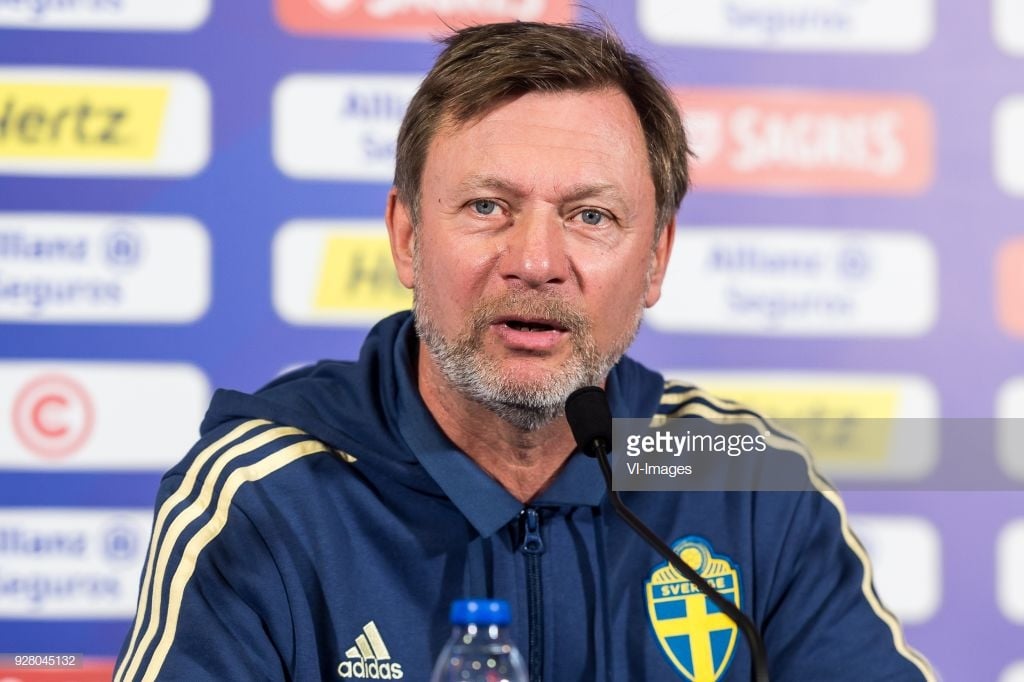Before Sweden’s friendly match against England, VAVEL UK sat down Peter Gerhardsson about how he’s adapted to his new role and his un-Swedish style of play.
New surroundings
Named as Pia Sundhage’s successor in late 2016, Gerhardsson didn’t call his first team into camp until Sundhage’s tenure concluded after the 2017 European Championships. The 59-year-old manager from Uppsala a breath of fresh air that brought new ideas and a distinctly new brand of football with him.
Nine and a half months after having been announced, Gerhardsson took charge of his first match as Sweden got their qualification bid for the 2019 Women’s World Cup underway. The match was far from vintage, the pitch in Varaždin slick with rain and bobbly, leaving Swedish attacks without fluency, however Blågult navigated the test to come away with all three points. His second match an awarded win after Denmark cancelled at the eleventh hour due to ongoing problems between DBU and Spillerforeningen.
Bit by bit, camp after camp, the team has come together, his ideas showing more and more. Qualification wasn’t a walk for the team but a break in the middle for the Algarve Cup gave the team longer to build and grow, firming up his style of play in the minds of the players. Gerhardsson’s 15 matches in charge have overall been a success, his record blotted with two losses – in qualification away to Ukraine and a friendly last month against Italy – two draws, one against France and the other South Korea, two more lessons to be learned.
At the helm for 14 months, the coach recounted his matches in charge, ticking off a mental box as he listed through them; the win away to Croatia, the draw in Bordeaux, the joy of qualifying in Viborg.
“I think this year has been pretty good, we’ve tried to play football which is very close to my own philosophy.”
Not a newcomer to women’s football, Gerhardsson has a strong history with the women’s game, notably having coached Bälinge IF for two years in the late 90’s.
“I was coach of a women’s team in Damallsvenskan for two years and I had the opportunity to go to the Olympics as a third coach in Atlanta 1996. I also worked in a football school, with 17 and 19 year-old girls and boys in the class. Me and my assistant coach, Magnus [Wikman], we worked together there for many years, we teach and coach in the same way, it doesn’t matter if it’s men or women, we keep everything the same. The big difference is to go from a club to a national team.”
A Dutch road-trip
With the best part of a year to kill between being announced by the SvFF and taking charge of his first match, the first job for the coach was a simple one: to see as many matches as possible. Away from women’s football for so long, Gerhardsson was stepping into the unknown, like a teacher on the first day at a new school, with a class full of new faces staring back at him, research was paramount.
“Getting information about players, seeing many games… in that time, in November 2016 when I got the job I hadn’t watched female soccer in Sweden for many, many years so I had to learn names and how the each person plays. I saw many games, I went to the European Championships and watched, I think, 15 games in that time. I got a car and drove to every game, most days you could only see one but sometimes you got lucky and you could see two.”
Although the tournament was far from a success for Sweden – Blågult had been knocked out of the quarter-finals by the Netherlands – the Euros gave Gerhardsson a refresher course in women’s football. Far from just learning more about his charges, the 59-year-old took a keen interest in the opposition, the final having made a clear impression on him.
“You can say the final, Denmark against the Netherlands… it was, for me very good that it was those two teams because that’s what I like in football, the offence; that’s how I think you win games.”
Despite seeing plenty of football, the coach yearned for more. Taking charge of matches second nature to him, banished from the pitch to the stands, he couldn't keep the smile from his face as he remembered his first match, the chance to feel the pitch beneath his shoes once more like finding a winning lottery ticket.
“The problem I had was not coaching teams, not being on the pitch… that was the frustration for me, I’m used to being five, six days a week in a club but then it was just watching football so when I met the ladies for the first time for the Croatia game I was very very lucky to be on the pitch.”
Matches and more matches
With his contact time with the team diminished, Gerhardsson has learned to adapt and keeps himself busy between camps, much more familiar with his charges than a year ago.
“I have learned… I knew when I got this job, I had to handle the things between the camps. I went out and saw many games but when I called up my first squad, for me and Magnus it was 23 new players, it didn’t matter if they had 100 caps."
He continued, “But now it’s easier because we have seen these players and we know what they can do and when we watch these games with other players we have more to compare with. But, to go from a club to the national team, you learn to handle the time between and for me it’s watching many games and watching the players.”
Not quite watching a match every day like during the Euros, the coach doesn’t understate the importance watching domestic matches plays. One of the main things on his agenda, making sure his application aligns to the player’s club teams.
“We try to see the players live as much as we can, both in Sweden and abroad. For us it’s also about contact with the club coaches because for me, you loan the players from the clubs, what they do in clubs is very important. I can’t say to a player, it doesn’t matter what you do in your club every day, 300 days a year, you have to play like this in the national team, so I have to talk to the coaches. The player plays the way I want in the club, in the same position, in the same attitude; the same way to play, that’s what we talk about, the structure is very important.”
With more and more players leaving Damallsvenskan to join teams in England, Germany and France (as well as elsewhere), the supply lines at home are strong as ever, the Swedes still churning out a glut of talented players every generation. Gerhardsson having used his squads to tweak and rotate, consistently bringing in younger players who’ve been excelling for their clubs.
The communication between himself and Under-23 coach Ulf Kristiansson hugely important, philosophies again aligning.
“We work very closely with the with the U23 team, very closely. We talk to the coach there because we want them to play in the same way we play in the senior team and it’s exactly what I said; it’s what they do in the club – it’s important – but it’s important what they do in the U23’s. If they do very well with the U23’s it could be more interesting to put them in the A team than if they play well for their club.”
Experience on the pitch in yellow and blue taking precedent with his latest team.
“For instance, the A team, we have one game on Sunday and the U23 team had one game on Thursday against Norway. I have some players in the U23’s now who could or should be in the senior squad if it was a championship or it was two games (so you can play many players) but, for me, it’s more important that they play the U23 game than coming here and being a substitute and not playing. They need experience in playing national games and it’s a good U23 game so it’s good for them.”
Philosophy
With the Swedes entrenched in a defensive style that whilst profitable, failed to harness the natural talents of those in the player pool, Gerhardsson brought a new style, attack on the agenda. Not just a style that remains close to his heart but one that breeds defensive strength through possession and keeping the ball as far from Hedvig Lindahl’s goal as possible, he sited the Euro final once again.
“It makes it a little easier say, the Netherlands and Denmark… when you see that game, that’s football. When the ladies see that game, they say that’s what we want to do.”
He continued, “We started to talk about defence and about the attitude to win the ball. But the structure and tactical thing was to work very much with our passing to get the confidence in the way to play. We talked a lot about the offensive way to play, about how much we want to be passing and things like that and less about the defence because the defence was more about the attitude. The training was offensive, but the attitude was defensive.”
The players needing little encouragement to switch to a more attacking style, ditching an all too familiar formation.
“I think in Sweden’s history it was like old England, so we coach in 4-4-2, but it’s not the way that Netherlands and Denmark play. I think modern players watch the best teams and that’s how they want to play so it’s not such a big problem to talk them into it but to coach them into it.”
As for his philosophy?
“It’s… many things and I have an idea that in Sweden we have been very bad. In Sweden, we talk, we have a lot of tactical training about the defence and I worked in the Swedish FA as a coach for coaches. It was more like seeing what coaches can teach and that was easy in the defence.”
He clarified, “But for me, it’s important we talk about creativity and structure. We had many years missing the structure in the offensive way to play so therefore I spend a lot of time on the structure in the offence up to the penalty box because when you come in the penalty box it’s more creative. You can’t coach that, it’s the player’s natural ability.”
Save for a few grey hairs and wrinkles, Peter Gerhardsson the coach the same as Peter Gerhardsson the player.
“I think, I like to… I’m an old striker myself, I like to win the ball high, I want to win the ball when it’s closer to the goal and if we can win it there, it’s very hard for the other team to create chances from their own half. Again, it’s the attitude; I want to have control of the ball, I want to have control of the game.”
Dark horses
With the team rapidly evolving and playing a flowing brand of attacking football they have yet to make it onto the radar as a dark horse to win the World Cup, but why not? For the coach, his team aren’t favourites but, well, there’s a possibility…
“Sometimes you can talk offence; we might win blahblah and you call it naïve. Or you can say defence but it’s cynical, but I think it’s in the middle and in the middle you can talk about possibility. Have we the possibility? I think, yes, we do.”
But it’s not bluster from the coach, the results for the team have been promising, the performances moreso.
“We won against Denmark who got to the European final, we drew against France and we beat Canada in the Algarve… and when you have the feeling, for me it’s okay to say that we can win the World Cup. Then we talk about now, about Sunday and game against England, if we can get a result and put in a good performance; me and the players, the Swedish people we will believe more. If we’re rubbish, it takes us down a bit, but we also have time to fix it. So on Sunday, against a team ranked third in the world; if we have a good performance, a good result… we will think about the possibility and that’s a very good feeling.”






































